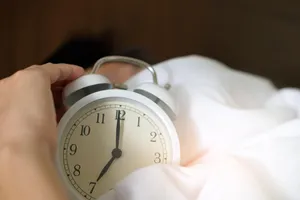How much sleep do you really need? Myths and facts about optimal sleep duration
Theresa Hauser, MSc. | 19.12.2024

Everyone knows the recommendation to sleep at least eight hours a night. But how much sleep do you actually need to be healthy and efficient? In this article, we clarify what scientists have discovered about the optimal sleep duration, which myths persist, and how sleep² can help you find your ideal sleep time.
Why sleep duration is individually different
The optimal sleep duration varies greatly from person to person and depends on factors such as age, genetic predisposition, and lifestyle. Studies by the National Sleep Foundation show that adults need an average of seven to nine hours of sleep per night. However, some people feel fit after just six hours, while others need nine hours to feel refreshed.
Myths about sleep duration
- Myth 1: Everyone needs eight hours of sleep: Eight hours is just a guideline; what matters is that you feel awake and efficient during the day.
- Myth 2: Less sleep increases productivity: Chronic sleep deprivation can have serious consequences, including concentration problems, performance declines, and health risks.
- Myth 3: Catching up on sleep over the weekend works: Studies show that irregular sleep patterns lead to health problems in the long term, and weekend sleep does not fully compensate for weekly deficits.
What does science say about the optimal sleep duration?
According to a study by the University of California, the risk of cognitive impairments and diseases such as diabetes and heart problems increases with both too little and too much sleep. However, keep in mind that chronically ill, exhausted, or medication-affected people often lie in bed for very long periods, and there is no evidence that (too) much sleep is directly negative. Therefore, a long sleep duration is a marker for health burdens—not their cause. A meta-analysis in the Journal of Sleep Research shows that people who regularly sleep seven to eight hours have the best cognitive performance.
How can you find your personal optimal sleep duration?
To determine your individual sleep duration, you should try the following steps:
- Sleep tracking: Use tools like the sleep² web app to document your sleep behavior over several weeks.
- Listen to your body: Observe after how many hours of sleep you feel most refreshed during the day.
- Experiment with different sleep times: Adjust your sleep duration in small steps and observe the effects on your daily form.
sleep² helps you achieve your optimal sleep duration
The sleep² app supports you in determining and maintaining your personal optimal sleep duration in the long term:
- Individual sleep analysis: Get detailed insights into your sleep behavior and recommendations based on your data.
- Targeted sleep optimization: Learn how to improve your sleep quality with targeted behavioral changes.
- Ensure long-term success: Track your progress and continuously adjust your sleep habits to your needs.
Test sleep² now and learn to sleep better!
To the sleep² appSources:
- National Sleep Foundation. (2015). National Sleep Foundation's sleep time duration recommendations: methodology and results summary. Sleep Health, 1(1), 40–43. https://doi.org/10.1016/j.sleh .
- Ferrie, J. E., et al. (2007). Change in sleep duration and cognitive function: findings from the Whitehall II Study. Sleep, 30(12), 1659–1666.
- Lo, J. C., Ong, J. L., Leong, R. L., Gooley, J. J., & Chee, M. W. (2016). Cognitive performance, sleepiness, and mood in partially sleep-deprived adolescents: A meta-analytic review. Journal of Sleep Research, 25(6), 595–605. https://doi.org/10.1111/jsr.12 . .





